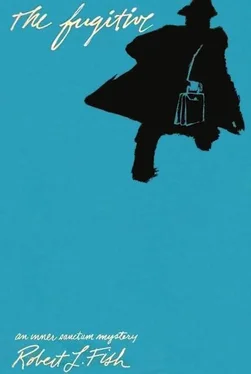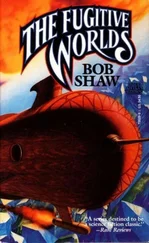The afternoon sun, reflected from a highly polished bureau in one corner of his room, fell across his face, and he slowly opened his eyes, coming back from the awful depths of his dreams, relaxing his tense muscles in little spasmodic shock waves. He lay without motion until the last twitching had passed, as one performing a familiar practice, boring but necessary. When his body finally released him, he slipped from the single sheet and padded to the open window, luxuriating in the cool breeze blowing in from the sea, scratching his neck, rubbing the sleep from his eyes.
Below, the broad beach was beginning to empty of the day’s crowds. The little umbrellas, like striped mushrooms, were beginning to be uprooted and furled. From the height of his window the waves seemed small and lazy, swiping playfully at the land with the withheld power of a lioness slapping her cub. Bounding the huge expanse of sand ran a gayly striped mosaic sidewalk, curving away in the distance, the wriggling design in black and white geometrically sharp when seen from above. Little awninged wagons sold ice cream; afternoon strollers passed arm in arm, squat figures foreshortened by the height, like puppets viewed by the puppet master. The screams of a group of youngsters playing volleyball came up softly, filtered by the distance, blending with the traffic sounds and the muted crash of surf. A sound track for peace, he thought. The beach is a buffer state, a neutral patch between the struggle of the land and the torment of the sea, and I suppose that is probably why people go there to escape. He smiled wryly. Why do I always reference things to war?
In the bathroom he locked the door and slowly stripped away the long-sleeved pajama tops with knit cuffs that never revealed his arms even during the most convoluted tossing of tortured sleep. The scar was old, poorly done in Paris by a man who had been more friend than surgeon, and the faint numerals could still be noted beneath the knotted skin. Well, he thought as always — a thought so ingrained as to be almost past bitterness — at any rate they knew how to make good aniline inks. I wonder if they still have a stock for the next batch.
The mirror had long since ceased to disappoint; now it only informed. He saw the pale, pudgy face, the wispy remains of the blond hair, the stringy neck and taut potbelly. The eyes were startlingly blue, huge in the small face. For no reason he smiled at his image, suddenly feeling pleased to be in Brazil, to be finally started, to be active once again. Who you are I can’t imagine, he said to the face in the mirror happily, and furthermore, I couldn’t care less.
When he emerged, having put on his shirt behind the locked door as always, the heat of the day was beginning to dissipate, the breeze from the ocean was strengthening, fluttering the curtains. He pulled on his pants, slipped his tie already knotted over his head and drew it up sharply, and was reaching for his shoes when the telephone rang stridently from the nightstand. The sudden shrill caused him to jump; the light mood disappeared.
“Yes?” he said tersely, his hand gripping the receiver tightly.
“Mr. Busch? Mr. Hans Busch?” The voice was quite impartial.
“Yes. I’m Mr. Busch.”
The voice paused imperceptibly. “This is the American Embassy, Mr. Busch. The assistant consul speaking. Your passport is in our possession.” The voice grew a bit chiding. “You are aware, I am sure, that the loss of a passport is supposed to be reported to the Embassy immediately? You are extremely fortunate that it was found as quickly as it was, and that it was turned in to the Embassy.”
“My passport? You have it?”
The voice became impatient. “If you would please come down to the Embassy at once? Any taxi can bring you, everyone is familiar with the American Embassy, it is quite a prominent building.” There was a pause, as if the speaker was thinking. “It is now four o’clock; we remain open until six. Please be sure and make it today. We do not recommend that American citizens go about in a foreign land without their identification, you know. Just ask for Mr. Murray.”
“I’ll be there.” A puzzle, this. But still, a relief.
“Thank you.” The voice did not thank him at all; it was quite disdainful, superior in all respects to people who lost passports within minutes of arrival, and then were so lacking in responsibility as to fail to report the loss immediately to Mr. Murray. The click of disconnection precluded any reply. He pressed the bar down thoughtfully, staring at the instrument. In sudden resolve he lifted his finger and pressed the receiver to his ear.
“Telefonista. Boa tarde.”
“Pardon me,” he said slowly, enunciating with maximum clarity. “Do you speak English?”
“But of certain.”
“Then I wonder if you would be so kind as to connect me with the American Embassy?”
“One moment only.”
He listened to the distant ringing, feeling all of the old satisfaction of having made a positive decision, his mind busily attempting to rationalize the reappearance of his passport. A receiver was lifted, and a voice of such pure boredom answered him as could only emanate from an official office. He asked for Mr. Murray and, after a series of clicks, heard the same voice as before. It really was the Embassy. He thought: I’m afraid I will give Mr. Murray ulcers, but I had to be sure. He considered hanging up quietly, but some spurt of pride, reborn with his decision to check the odd call, would not allow this.
“Mr. Murray? This is Mr. Busch again. I just wanted to be sure that I understood. You did say my passport had been recovered and that I could pick it up if I passed by?”
To his surprise the disdainful outburst he had anticipated did not materialize; the voice sounded almost amused, understanding.
“Yes, Mr. Busch,” it said. “I did say it. And I really meant it. Before six, Mr. Busch. Goodbye.”
He was pulling on his jacket when he noticed the newspaper lying under the door where some hotel employee had slipped it during his nap. It was a tabloidsized paper, printed in English, and a small printed form glued to one corner advised him that the management hoped he would enjoy reading the news in his own language. I hope so too, he thought and, tearing off the tab, dropped onto the bed to scan the headlines. There was nothing on the front page; he flipped the pages, a bit perturbed. Then it was staring out at him, a medium-sized article under the Stateside basketball scores. Folding the paper, he carried it to the brighter light at the window to read.
It was headed quite simply, EMBEZZLEMENT SUSPECT IN RIO and read:
New York, Feb. 12 (UPI): Hans Busch, well known in the United States for his frequent anti-Semitic articles and pamphlets, and wanted at present by the New York District Attorney’s office for questioning in connection with the recent failure of several importing companies with which he was alleged to be connected, is reported to have left International Airport at Idlewild last night by Pan-American Airways with destination listed on the passenger list as Rio de Janeiro, Brazil.
Busch, a naturalized American citizen, is suspected of absconding with funds of the Germanic-Atlantic Trading Co. and the Hamburg-Atlantic Import Co., both of New York. While the exact nature of the embezzlement charge has not as yet been revealed, it is rumored that Busch fled with nearly two million dollars in cash.
A high official of the New York Police Department stated last night that Busch is also wanted by Federal authorities for questioning in regard to the recent wave of swastika-painting and synagogue-burning that has swept the eastern part of the United States, as well as cities of both Europe and South America.
Читать дальше












